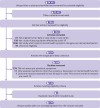Comparison of mental health symptoms before and during the covid-19 pandemic: evidence from a systematic review and meta-analysis of 134 cohorts
- PMID: 36889797
- PMCID: PMC9992728
- DOI: 10.1136/bmj-2022-074224
Comparison of mental health symptoms before and during the covid-19 pandemic: evidence from a systematic review and meta-analysis of 134 cohorts
Abstract
Objective: To synthesise results of mental health outcomes in cohorts before and during the covid-19 pandemic.
Design: Systematic review.
Data sources: Medline, PsycINFO, CINAHL, Embase, Web of Science, China National Knowledge Infrastructure, Wanfang, medRxiv, and Open Science Framework Preprints.
Eligibility criteria for selecting studies: Studies comparing general mental health, anxiety symptoms, or depression symptoms assessed from 1 January 2020 or later with outcomes collected from 1 January 2018 to 31 December 2019 in any population, and comprising ≥90% of the same participants before and during the covid-19 pandemic or using statistical methods to account for missing data. Restricted maximum likelihood random effects meta-analyses (worse covid-19 outcomes representing positive change) were performed. Risk of bias was assessed using an adapted Joanna Briggs Institute Checklist for Prevalence Studies.
Results: As of 11 April 2022, 94 411 unique titles and abstracts including 137 unique studies from 134 cohorts were reviewed. Most of the studies were from high income (n=105, 77%) or upper middle income (n=28, 20%) countries. Among general population studies, no changes were found for general mental health (standardised mean difference (SMD)change 0.11, 95% confidence interval -0.00 to 0.22) or anxiety symptoms (0.05, -0.04 to 0.13), but depression symptoms worsened minimally (0.12, 0.01 to 0.24). Among women or female participants, general mental health (0.22, 0.08 to 0.35), anxiety symptoms (0.20, 0.12 to 0.29), and depression symptoms (0.22, 0.05 to 0.40) worsened by minimal to small amounts. In 27 other analyses across outcome domains among subgroups other than women or female participants, five analyses suggested that symptoms worsened by minimal or small amounts, and two suggested minimal or small improvements. No other subgroup experienced changes across all outcome domains. In three studies with data from March to April 2020 and late 2020, symptoms were unchanged from pre-covid-19 levels at both assessments or increased initially then returned to pre-covid-19 levels. Substantial heterogeneity and risk of bias were present across analyses.
Conclusions: High risk of bias in many studies and substantial heterogeneity suggest caution in interpreting results. Nonetheless, most symptom change estimates for general mental health, anxiety symptoms, and depression symptoms were close to zero and not statistically significant, and significant changes were of minimal to small magnitudes. Small negative changes occurred for women or female participants in all domains. The authors will update the results of this systematic review as more evidence accrues, with study results posted online (https://www.depressd.ca/covid-19-mental-health).
Review registration: PROSPERO CRD42020179703.
© Author(s) (or their employer(s)) 2019. Re-use permitted under CC BY-NC. No commercial re-use. See rights and permissions. Published by BMJ.
Conflict of interest statement
Competing interests: All authors have completed the ICJME uniform disclosure form at www.icmje.org/coi_disclosure.pdf and declare: support from the Canadian Institutes of Health Research and McGill Interdisciplinary Initiative in Infection and Immunity Emergency covid-19 Research Fund; no financial relationships with any organisations that might have an interest in the submitted work in the previous three years. All authors declare no relationships or activities that could appear to have influenced the submitted work. BDT and AB declared that they were authors of an included study (see supplementary reference S118.)
Comment in
-
Mental health and the covid-19 pandemic.BMJ. 2023 Mar 8;380:435. doi: 10.1136/bmj.p435. BMJ. 2023. PMID: 36889801 No abstract available.
References
-
- World Health Organization. Mental health and COVID-19. Accessed 29 Jan 2023. https://www.who.int/europe/emergencies/situations/covid-19/mental-health....
-
- Centers for Disease Control and Prevention. Coping with Stress. Accessed 29 Jan 2023. https://www.cdc.gov/mentalhealth/stress-coping/cope-with-stress/index.html.
-
- The DEPRESSD Project. Living systematic review of mental health in COVID-19. Accessed 29 Jan 2023. https://www.depressd.ca/covid-19-mental-health.
Publication types
MeSH terms
LinkOut - more resources
Full Text Sources
Medical
Research Materials
Miscellaneous


